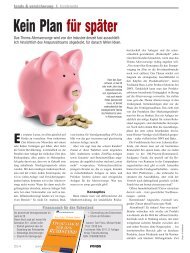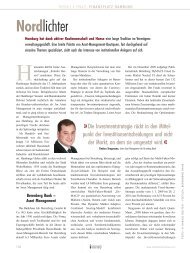Traditional German life funds are dominated by ... - Anke Dembowski
Traditional German life funds are dominated by ... - Anke Dembowski
Traditional German life funds are dominated by ... - Anke Dembowski
Create successful ePaper yourself
Turn your PDF publications into a flip-book with our unique Google optimized e-Paper software.
german asset allocation<br />
Table 1: Investment restrictions for the assets of <strong>German</strong><br />
Insurance companies, according to the Anlageverordnung (AnlV):<br />
Asset class<br />
Maximum<br />
Risk capital quota in total (equities, etc.) 35%<br />
Property, REITs, property <strong>funds</strong> 25%<br />
Accounts receivable from securities lending 5%<br />
Asset-backed securities and credit linked notes 7.5%<br />
Hedge <strong>funds</strong> (launched in Euroland) 5%<br />
Other instruments (“trash clause“) 5%<br />
…with agreement of BaFin this can be increased to 10%<br />
* In addition, there <strong>are</strong> restrictions per issuer and per debtor, and<br />
there <strong>are</strong> diversification rules.<br />
Table 2: Investments of <strong>German</strong> <strong>life</strong> insurance companies (average)<br />
June 30, 2008 end 2007 end 2006 end 2005<br />
Bonds 79.7% 78.8% 78.1% 78.1%<br />
Equity 7.8% 8.7% 8.7% 8.6%<br />
Property 3.4% 3.4% 3.9% 4.1%<br />
Partnerships 2.3% 2.2% 2.3% 2.3%<br />
Other 6.9% 6.8% 7.0% 7.0%<br />
Total 100%* 100%* 100% 100%*<br />
* including rounding differences<br />
rules, as seen in the new VVG contract law, make the cost structure of<br />
<strong>life</strong> insurance products appear higher to clients than before. This, in<br />
combination with the given degree of inflexibility, has made made <strong>life</strong><br />
products appear less attractive to clients.<br />
This leaves <strong>German</strong> <strong>life</strong> insurance companies with two possibilities:<br />
the first is to increase the flexibility of their products, and to add bells<br />
and whistles that investors like; the second is to emphasise the safety and<br />
security of a <strong>life</strong> insurance contract, with all the guarantees it provides.<br />
During crisis: more conservative asset allocation<br />
<strong>German</strong> <strong>life</strong> insurance companies have learnt their lesson since the dotcom<br />
bubble, when some got caught with a relatively high equity quota<br />
of 15% to 20%. This made it difficult to provide the guaranteed annual<br />
minimum performance. In 2003, for example, the <strong>German</strong> <strong>life</strong> insurance<br />
guarantee organisation Protektor was forced to take over<br />
Mannheimer Leben and guarantee its <strong>life</strong> insurance contracts until surrender<br />
or maturity. However, Mannheimer’s surplus <strong>funds</strong> were withheld<br />
from policyholders, resulting in a loss of bonus payments. <strong>German</strong><br />
insurers point out that Protektor’s guarantees <strong>are</strong> more robust than<br />
those available offshore.<br />
Wicke explains that W&W has reacted to the current crisis <strong>by</strong> buying<br />
put options to hedge its existing equity positions. “On the bond side, we<br />
have reduced our exposure to US banks since September 2007 to reduce<br />
the credit risk,” he says. W&W group, as a whole, has €35 billion of<br />
assets, meaning its losses related to Lehman Brothers (€3.3 million) and<br />
AIG (€3.6 million) <strong>are</strong> quite small. “We not only reduced our bond<br />
position with US banks, but our exposure to banks as a whole.<br />
Throughout 2008 we reduced our risk level, <strong>by</strong> reducing second-tier<br />
papers, and since spring 2008 we only buy covered bonds (Pfandbriefe).”<br />
Market values of the bond positions have fallen, “but in practice, this is<br />
not a critical issue as long as there <strong>are</strong> no issues that require an impairment,<br />
as we normally hold the bonds until maturity,” says Wicke.<br />
R+V Versicherung has also reduced its risk, as Siegmund explains. “We<br />
were more optimistic regarding equities at the beginning of the year<br />
than we <strong>are</strong> now. We think the negative effect of the crisis on the industrial<br />
companies is not fully priced in and the negative trend has further<br />
“This crisis clearly shows that in the<br />
current Solvency II discussion about the<br />
treatment of equity risk, it is <strong>German</strong>y,<br />
the UK and the rest of Europe’s approach<br />
that is adequate – and not France’s”<br />
Jan Wicke, Wuestenrot & Wuerttembergische<br />
to run. So we have reduced our equity position from about 15% at the<br />
end of 2007 to about 5% right now.” However, R+V is taking more risk<br />
now in credit: “About 50% of our bond portfolio consists of Pfandbriefe<br />
and individual mortgage-backed loans,” says Siegmund.<br />
Uniquely, <strong>German</strong> <strong>life</strong> companies <strong>are</strong> allowed to offer retail mortgage<br />
loans directly to customers, with the rationale that they understand the<br />
collateral well, since they also provide the mortgage holder with a <strong>life</strong><br />
insurance policy. Siegmund continues: “During the past months, we<br />
saw the attractive credit spreads that were building up again, so we took<br />
on more risk <strong>by</strong> increasing our position in bank and corporate bonds.<br />
On the other hand, we need to take out risk, which we did <strong>by</strong> reducing<br />
or hedging our equity position.”<br />
Meanwhile, Debeka, which is based in Koblenz, will be focusing on<br />
government bonds in the near future. Ranked sixth in terms of premium<br />
income, it is known as one of <strong>German</strong>y’s most conservative insurance<br />
companies – and Rolf Florian, director for finance, IT and organisation,<br />
and member of the Debeka Versicherungen board, says this conservatism<br />
has paid off: “Debeka-Group has less than 1% of its €50 billion<br />
assets invested in equities. Also, we did not turn towards absolute return<br />
mandates, structured notes or alternative assets during the years 2003 to<br />
2008, when these instruments became popular elsewhere,” he says.<br />
With only 1% equity exposure, Debeka is on the low end. Other <strong>German</strong><br />
<strong>life</strong> insurance companies go as high as 15%, with the average equity<br />
exposure being roughly 8%.<br />
When asked about the investments in problematic issuers, Florian<br />
insists he has no need to worry. “Our investments <strong>are</strong> well diversified.<br />
20<br />
Life & Pensions










